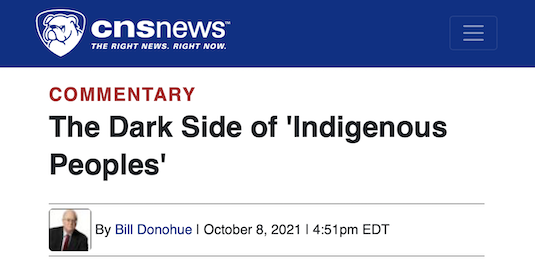Leading up to Columbus Day, CNSNews.com published a three-part series by dishonest Catholic Bill Donohue on why Americans should celebrate Columbus Day enthusiastically and without guilt.
In his Oct. 6 column, Donohue complained about Howard Zinn and other professors who stray from the narrative that Columbus was a universally good person:
The fact is that many professors, especially in the humanities and social sciences, hate Western civilization; they have a particular animus against the United States. That this is happening at a time when many poor people from Latin America are crashing our borders is perverse. Yet the pampered professors still keep railing against the U.S. They just don’t get it.
[…]To top things off, those who are bashing Columbus are simultaneously lauding the legacy of Indigenous peoples. Yet a closer, and independent, examination of their historical record raises serious questions about their assigned “oppressed” status. But given the Manichean dualism that is operative—the good guys are non-whites and the bad guys are white—the outcome is predictable.
On Oct. 7, Donohue railed at the National Education Association for favoring changing Columbus Day to Indigenous People’s Day:
This is not a healthy situation. A country that cannot agree on whom to honor is in trouble. Worse, a country whose public officials take no action against those who destroy statues on public land of those who have made significant contributions to American society are sending the wrong message. When a nation’s historically renowned figures become part of our throw-away culture, it does not bode well for instilling patriotism in young people.
Judging past historical figures through today’s lens will likely mean that some of those in favor of excising tributes to legendary persons will themselves be erased from history. So be it.
We at the Catholic League are taking off Monday, in honor of Christopher Columbus. Sorry NEA, you carry no weight with us.
Donohue used his Oct. 8 column to serve up what he promised two days earlier would be “a politically incorrect look at Indigenous Americans,” which started off this way:
Just as bad, some promote the idea that virtually all the Indians were kindly souls who respected the land and treated each other with dignity. This is a romantic fairy tale having no basis in history. The truth is that some were gentle while others were brutal.
It is also part of the conventional wisdom that almost all the Indians were massacred by the white man. Wrong.
He then disproved his own point by citing a researcher who admitted that nearly all Indians died after “the coming of the white man,” and that it “occurred through such factors as the importation of virulent diseases previously unknown in the Americas, the destruction of settled life-styles, enslavement, and the psychological effects of conquest rather than through overt murders and slaughters, although plenty of these took place.” Just because a large number weren’t outright massacred doesn’t mean that the “white man” didn’t kill them.
Donohue then denigrated the idea that Native Americans were “indigenous”:
Before detailing the dark side of Indigenous peoples, as a corrective to the prevailing notion that only the white man acted unjustly, it is important to note that the term “Indigenous” is misleading. The Indians were immigrants who came here from Asia. In “prehistoric times,” they “crossed the land bridge across the Bering Strait to the lands of the Western Hemisphere.”
Donohue followed that with a list of alleged Native American atrocities; while some were between tribes, others were against British and American settlers. He didn’t explain why Native Americans should not have fought to defend their lands and livelihood. In his final example on the series of U.S.-Indian wars, Donohue seemed to be blaming Native Americans for their demise because defeating Custer at Little Big Horn led to the U.S. increasing its military activity, which “culminated in the Wounded Knee Massacre on December 29, 1890,” which he frames as at least somewhat justified because U.S. troops feared “a repeat of Little Big Horn” so they fired on a tribe of disarmed Lakota tribe, killing 250 Lakota men, women, and children.
And that, Donohue wants you to believe, is why Americans should celebrate Columbus Day.
